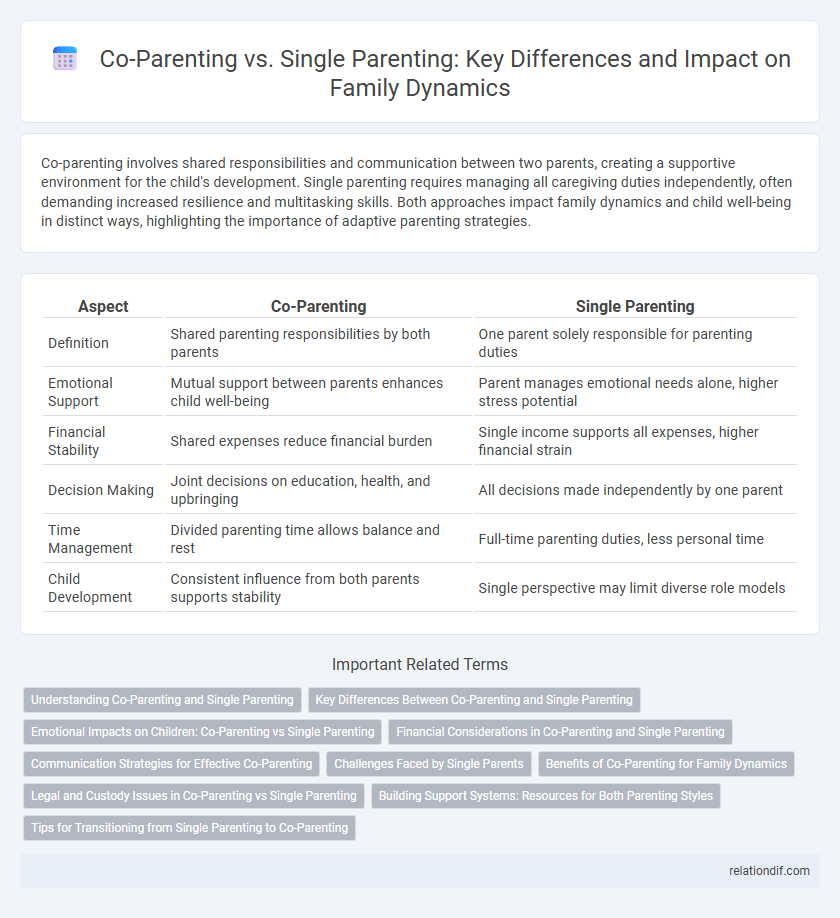Co-parenting involves shared responsibilities and communication between two parents, creating a supportive environment for the child's development. Single parenting requires managing all caregiving duties independently, often demanding increased resilience and multitasking skills. Both approaches impact family dynamics and child well-being in distinct ways, highlighting the importance of adaptive parenting strategies.
Table of Comparison
| Aspect | Co-Parenting | Single Parenting |
|---|---|---|
| Definition | Shared parenting responsibilities by both parents | One parent solely responsible for parenting duties |
| Emotional Support | Mutual support between parents enhances child well-being | Parent manages emotional needs alone, higher stress potential |
| Financial Stability | Shared expenses reduce financial burden | Single income supports all expenses, higher financial strain |
| Decision Making | Joint decisions on education, health, and upbringing | All decisions made independently by one parent |
| Time Management | Divided parenting time allows balance and rest | Full-time parenting duties, less personal time |
| Child Development | Consistent influence from both parents supports stability | Single perspective may limit diverse role models |
Understanding Co-Parenting and Single Parenting
Co-parenting involves shared responsibilities and collaboration between two parents to raise their child, ensuring consistent communication and joint decision-making for the child's well-being. Single parenting requires one individual to fulfill all parental roles independently, managing both emotional support and daily physical care. Understanding the distinct challenges and benefits of each approach helps optimize child development and family dynamics.
Key Differences Between Co-Parenting and Single Parenting
Co-parenting involves shared responsibilities and coordination between two parents who actively work together to raise their children, fostering stability and balanced emotional support. Single parenting requires one parent to fulfill all caregiving roles independently, often facing increased challenges in time management, financial burdens, and decision-making. The key differences lie in collaboration, resource distribution, and emotional dynamics impacting the child's development and well-being.
Emotional Impacts on Children: Co-Parenting vs Single Parenting
Children in co-parenting arrangements often experience more emotional stability due to consistent involvement from both parents, fostering a sense of security and balanced support. In contrast, single parenting can lead to increased emotional challenges for children, including feelings of abandonment or divided loyalty, potentially impacting their self-esteem and social development. Research indicates that supportive co-parenting environments contribute to better emotional regulation and reduced behavioral problems in children compared to single-parent households.
Financial Considerations in Co-Parenting and Single Parenting
Co-parenting often allows for shared financial responsibilities, reducing the individual burden of child-related expenses such as healthcare, education, and extracurricular activities. Single parenting typically requires managing the entire financial load alone, which can increase stress due to limited income sources and reduced flexibility in budgeting. Access to child support payments and government assistance programs can partially alleviate financial challenges unique to single parents.
Communication Strategies for Effective Co-Parenting
Effective co-parenting relies heavily on clear, respectful communication strategies that prioritize the child's well-being and consistency across households. Establishing regular check-ins, using shared digital calendars, and maintaining neutral, solution-focused dialogue reduce conflicts and foster collaboration between co-parents. Unlike single parenting, where decision-making rests solely on one individual, co-parenting demands intentional coordination and mutual respect to ensure stability and emotional support for the child.
Challenges Faced by Single Parents
Single parents often face significant challenges such as financial strain, limited time for personal and professional responsibilities, and the emotional stress of managing all parenting duties alone. Unlike co-parenting arrangements where responsibilities are shared, single parents must balance childcare, household tasks, and career demands without consistent support. This can lead to increased fatigue, social isolation, and difficulties in providing stable routines for children.
Benefits of Co-Parenting for Family Dynamics
Co-parenting fosters a balanced upbringing by allowing children to benefit from the active involvement of both parents, enhancing emotional stability and social development. Shared responsibilities reduce parental stress and improve decision-making, promoting healthier family dynamics. Consistent communication and cooperation between co-parents contribute to a supportive environment that nurtures children's well-being and resilience.
Legal and Custody Issues in Co-Parenting vs Single Parenting
Co-parenting often involves shared legal responsibilities and joint custody arrangements, requiring cooperation between parents to make decisions regarding the child's welfare, education, and healthcare. Single parenting typically grants sole legal custody, giving one parent full authority and responsibility but also limiting the other parent's legal rights and involvement. Understanding custody laws and legal obligations is crucial in both scenarios to ensure the child's best interests and parental rights are protected.
Building Support Systems: Resources for Both Parenting Styles
Co-parenting benefits from collaborative support networks including mediation services, parenting classes, and joint counseling, which foster communication and shared responsibilities. Single parenting often relies on community resources such as local childcare programs, support groups, and extended family involvement to provide emotional and logistical assistance. Both parenting styles thrive when access to mental health professionals, financial aid programs, and flexible work arrangements create a robust foundation for their children's well-being.
Tips for Transitioning from Single Parenting to Co-Parenting
Establishing clear and consistent communication channels with the co-parent fosters cooperation and reduces conflicts during the transition from single parenting to co-parenting. Prioritizing the child's emotional stability by creating unified routines and discipline strategies supports a smoother adjustment for all family members. Utilizing mediation or counseling services can provide valuable guidance and promote healthy co-parenting dynamics.
co-parenting vs single parenting Infographic

 relationdif.com
relationdif.com